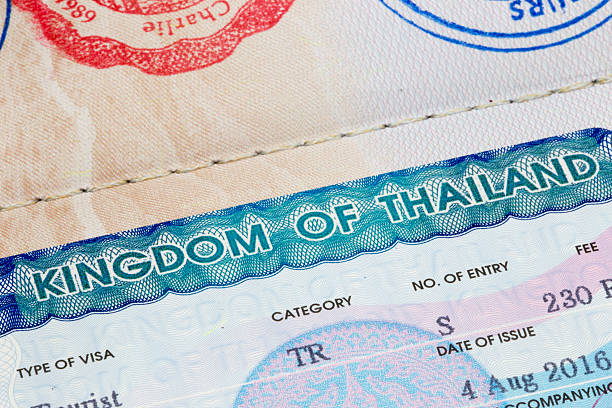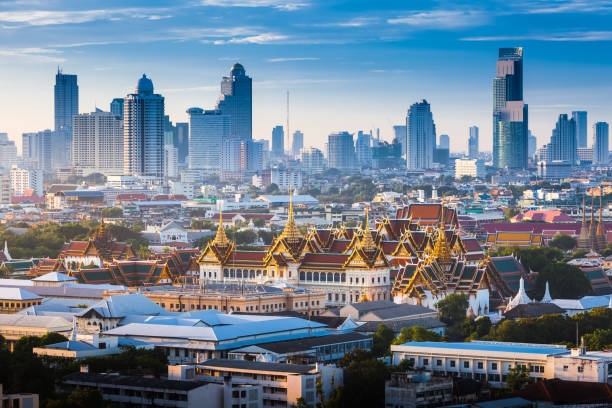US Visas for Thai Citizens – Complete Guide to Application, Requirements, and Process



US Visas for Thai Citizens
For Thai citizens planning to travel, study, work, or live in the United States, obtaining the right US visa is the first and most important step. The process involves detailed requirements, documentation, and preparation to ensure approval.
At My Thailand Lawyer, based in Bangkok, we provide professional guidance to Thai citizens who want to successfully secure their US visa. Whether you are applying for a tourist visa, student visa, fiancé(e) visa, or work visa, our legal team ensures that every step of your application is handled correctly to increase your chances of approval.
This comprehensive guide explains the types of US visas available for Thai citizens, eligibility requirements, application procedures, supporting documents, and legal considerations.
Understanding US Visas for Thai Citizens
A US visa allows Thai citizens to travel to the United States for a specific purpose and duration. Visas are generally divided into two main categories:
Non-Immigrant Visas – For temporary stays, such as tourism, business, study, or work.
Immigrant Visas – For permanent residence in the United States, often based on family or employment sponsorship.
The visa you need depends on the purpose of your trip. Each category has different requirements, processing times, and documentation.
Types of US Visas for Thai Citizens
1. US Tourist Visa (B1/B2)
The B1/B2 visa is the most common US visa for Thai citizens who want to visit the United States for tourism, leisure, family visits, or business purposes. It is usually granted for multiple entries and can be valid for several years.
2. US Student Visa (F1/M1)
Thai students planning to pursue higher education or vocational training in the United States need a student visa. The F1 visa is for academic programs, while the M1 visa is for vocational or non-academic studies. Applicants must first be accepted by a US educational institution.
3. US Work Visa (H1B, L1, O1, etc.)
Work visas are available for Thai citizens who have employment offers from US companies. These visas include specialized categories such as the H1B for skilled professionals, L1 for intra-company transfers, and O1 for individuals with extraordinary abilities.
4. US Fiancé(e) Visa (K1)
Thai citizens engaged to US citizens may apply for a K1 visa, which allows entry into the United States for the purpose of marriage. The couple must legally marry within 90 days of arrival, after which the Thai spouse may adjust status to permanent residency.
5. US Spouse Visa (CR1/IR1)
For Thai citizens already married to US citizens, the CR1 or IR1 immigrant visa allows them to move to the United States as lawful permanent residents.
6. US Business Visa (E2 Investor Visa)
Thai entrepreneurs and investors may apply for visas that allow them to establish or manage businesses in the United States.
7. Other Non-Immigrant Visas
Depending on the purpose of travel, Thai citizens may also apply for other categories, including exchange visitor visas (J1), cultural exchange visas, or specialty employment visas.
General Requirements for Thai Citizens Applying for US Visas
Although each visa category has specific requirements, common elements for Thai citizens include:
Valid Thai passport.
Completed DS-160 form (for non-immigrant visas) or DS-260 form (for immigrant visas).
Recent passport-sized photographs.
Proof of financial stability to support the trip.
Evidence of ties to Thailand (employment, property, family).
Appointment confirmation for the US Embassy interview in Bangkok.
Application fee receipt.
Additional documents vary depending on the type of visa. For example, student visa applicants require an I-20 form issued by the US school, while fiancé(e) visa applicants must submit proof of relationship.
US Visa Application Process for Thai Citizens
Step 1: Determine the Visa Type
Identify the correct visa based on the purpose of your travel (tourism, study, marriage, work, etc.).
Step 2: Complete the Online Application
Fill out the DS-160 or DS-260 form online, depending on whether you are applying for a non-immigrant or immigrant visa.
Step 3: Pay the Application Fee
Pay the required application fee to proceed with the visa process.
Step 4: Schedule an Interview at the US Embassy in Bangkok
Thai citizens must attend a visa interview at the US Embassy in Bangkok. Appointments are scheduled online after payment of the fee.
Step 5: Prepare Supporting Documents
Gather all documents required for the interview, including financial statements, proof of ties to Thailand, and visa-specific documents.
Step 6: Attend the Embassy Interview
During the interview, a consular officer will assess eligibility. Questions often cover the purpose of travel, employment in Thailand, financial status, and personal ties to the country.
Step 7: Wait for Visa Processing
If approved, the visa is issued and attached to your passport. Processing times vary depending on the visa type.
Common Challenges for Thai Citizens in US Visa Applications
Applying for a US visa can be complex, and Thai citizens often face difficulties such as:
Incomplete or incorrectly filled application forms.
Insufficient financial documentation.
Lack of evidence showing strong ties to Thailand.
Limited English proficiency during the interview.
Misunderstanding of required documents.
These challenges often lead to delays or denials. Professional legal assistance can help applicants avoid these problems.
How My Thailand Lawyer Helps with US Visa Applications
At My Thailand Lawyer, our Bangkok-based legal team specializes in assisting Thai citizens with all types of US visa applications. Our services include:
Step-by-step guidance on the entire application process.
Preparation and review of required documents.
Coaching for the US Embassy interview.
Translation and certification of Thai documents.
Legal advice on the most suitable visa category.
Assistance with renewals or changes of visa status.
Our goal is to maximize the chances of approval while ensuring that every application meets US immigration standards.
Important Considerations for Thai Citizens Applying for US Visas
Proof of Ties to Thailand
Consular officers need to be convinced that the applicant will return to Thailand after visiting the US, especially for tourist and student visas. Applicants should present employment contracts, family records, property ownership, or business documents.
English Proficiency
While not a formal requirement for all visas, basic English communication is necessary during the interview. For student visas, proof of English language ability (such as TOEFL or IELTS) is mandatory.
Honesty During the Interview
Providing false information or fake documents can result in immediate denial and long-term visa ineligibility.
Document Translations
All Thai-language documents must be translated into English by certified translators before submission to the US Embassy.
Renewal and Extension of US Visas for Thai Citizens
Some US visas, such as the B1/B2 tourist visa, can be valid for multiple years. However, the length of stay during each visit is determined by US Customs and Border Protection at the port of entry.
In certain cases, Thai citizens may apply for extensions while in the United States, provided they meet the legal requirements. Student visas, for example, may be extended for the duration of studies.
Frequently Asked Questions About US Visas for Thai Citizens
1. Can Thai citizens apply for a US visa without a sponsor?
Yes, Thai citizens can apply for tourist or business visas independently without a sponsor, provided they meet financial requirements.
2. How long does the US visa process take in Thailand?
Processing times vary by visa category, but applicants should expect several weeks from the time of the interview until visa issuance.
3. Can a Thai citizen work in the US on a tourist visa?
No. A tourist visa does not permit employment in the United States. Thai citizens must apply for the appropriate work visa.
4. Do Thai citizens need a visa to visit the US for short trips?
Yes. Thailand is not part of the US Visa Waiver Program. All Thai citizens must obtain a visa before traveling.
5. What happens if a visa is denied?
If denied, applicants can reapply, but they must address the reasons for denial. Professional assistance can help strengthen the new application.
Tips for a Successful US Visa Application for Thai Citizens
Prepare all documents thoroughly and well in advance.
Be honest and consistent in all information provided.
Show clear evidence of ties to Thailand to demonstrate intent to return.
Practice for the interview to answer confidently and clearly.
Seek professional guidance to minimize mistakes and maximize approval chances.
Applying for a US visa as a Thai citizen requires careful preparation, accurate documentation, and a strong understanding of US immigration rules. Each visa category has unique requirements, and the process can be overwhelming without proper guidance.
At My Thailand Lawyer in Bangkok, we specialize in assisting Thai citizens with every stage of the visa process. From determining the right visa type to preparing for the embassy interview, our expert legal team is here to make the process smooth and stress-free.
If you are a Thai citizen planning to travel, study, work, or live in the United States, let My Thailand Lawyer be your trusted partner for a successful US visa application.
